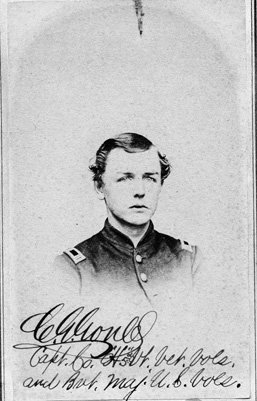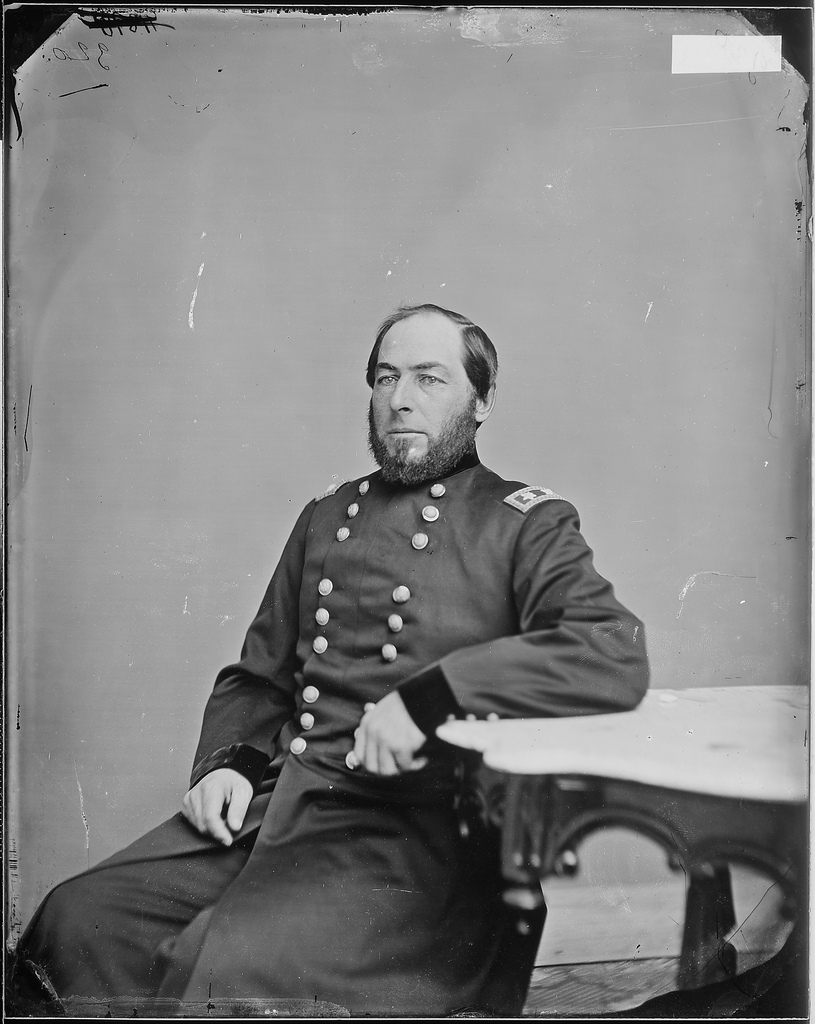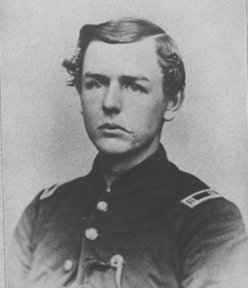If You’re Not First, You’re Last: Charles Gould’s Medal Citation

Recently I have fielded a couple inquiries about who I really believe was the first Union soldier to breach the Confederate earthworks outside of Petersburg, Virginia. I still remain convinced that Captain Charles Gould, 5th Vermont Infantry, was the first of the Sixth Corps to get inside the Confederate defenses on April 2, 1865. Quite a few others have compelling cases. The Ninth Corps attacked the city’s southeast defenses earlier in the morning but remained bogged down around Fort Mahone for most of the day, while the impact of the Sixth Corps charge was immediate and decisive. Given the wide span of the Sixth Corps’ attack and its early morning hour, it is impossible to truly say. Gould belatedly received the Medal of Honor in 1890 but was not satisfied what his citation, stating he did not desire any recognition that did not specifically state he was indeed the first.
Gould had a strong basis for his case, explored in this earlier article. Captain Merritt Barber led the Vermont Brigade that morning in place of its usual commander, Brigadier General Lewis Addison Grant, who was wounded by Confederate picket fire preliminary to the attack. Barber reported: “It is confidently believed that Captain Charles G. Gould, of the Fifth Vermont, was the first man of the Sixth Corps who mounted the enemy’s works. His regiment was in the first line of the brigade and in the charge he was far in advance of his command.”[1]
Lewis Grant was afterward instrumental in awarding Gould the medal, serving as Assistant Secretary of War in 1890. “I think there is no doubt of the fact that Capt. Charles G. Gould, 5th Vt. Vols., was first upon the rebel works,” he wrote. “The attack was direct and rapid, and Capt. Gould’s regiment, being the front, was naturally first upon the works. I have taken much pains to consider the evidence and it seems to me conclusive that Captain Gould was the first upon the works.” It should be noted that at the time Grant was also lobbying for recognition for himself as the brainchild of the attack. He probably does deserve that credit, as Gould likely does for being first, but I’ll admit that any statement from Grant recognizing his brigade also served to advance his own agenda.[2]
As part of his role with the War Department, Grant proudly notified Gould of his award. “Though it is more than twenty-five years since the battle of Petersburg was fought, it is a matter of great pleasure to me to able to forward you, herewith, a Medal of Honor, authorized by Act of Congress, and dated Petersburg, April 2, 1865,” he wrote. “This comes to you unsolicited. It is the voluntary act of the Government you fought to preserve, and a just, though tardy, recognition of your gallant and distinguished conduct on that occasion.”[3] The Medal citation stated:
The President of the United States of America, in the name of Congress, takes pleasure in presenting the Medal of Honor to Captain (Infantry) Charles Gilbert Gould, United States Army, for extraordinary heroism on 2 April 1865, while serving with Company H, 5th Vermont Infantry, in action at Petersburg, Virginia. Among the first to mount the enemy’s works in the assault. Captain Gould received a serious wound in the face, was struck several times with clubbed muskets, but bravely stood his ground, and with his sword killed the man who bayoneted him.
Gould’s comrades were pleased to see the honor bestowed. First Lieutenant Austin H. Hall, 3rd Vermont Infantry, wrote, “without detracting an iota from the credit belong to the thousands of ‘boys in blue’ who nobly upheld the flag of the Union on that never-to-be-forgotten day, I am in a position to state that the honors paid Capt. Gould he was eminently deserving of, and in honoring him the Government honors itself.”[4]
The Army changed the medal design in 1896 due to misused imitation. They changed it again in 1904 to distinguish it from a popular Grant Army of the Republic medal. Prior Medal of Honor recipients received instructions to trade their old medals in for new ones, though Congress afterward decided to allow pre-1904 recipients to keep both designs. Gould hoped to use the opportunity to correct his unsatisfying citation and immediately reached out to Vermont Senator Redfield Proctor to change his medal.
Proctor had served as an officer in the Vermont Brigade, briefly belonging to the 5th Vermont Infantry prior to Gould’s transfer to the unit. He later served as Governor of Vermont and was the Secretary of War when Gould received his medal. He was a logical choice for assistance, but Gould’s options were limited. The severity of his wounds suffered during the Breakthrough had forced Gould to seek a warmer climate than Vermont offered. He moved to Washington, DC at the end of 1865 and worked in the pension and patent offices. Due to the District of Columbia’s “taxation without representation,” Gould had no home congressman. I recently found a 1916 newspaper article recording the one and only time that Gould was actually able to vote for president, having moved back to Vermont just before his death.
Thus, he wrote to his adopted senator in 1904 that his award citation was “incorrect, or at least not strictly accurate. It begins ‘Among the first.’ I have always understood, and never heard it questioned, that I was the first to enter the enemy’s works at Petersburg.”[5] As proof, Gould referred to Barber’s report, Grant’s statement, and papers by Maj. Aldace Freeman Walker, 1st Vermont Heavy Artillery, and Lt. Col. Hazard Stevens, of Brig. Gen. George W. Getty’s division staff.[6] He believed that the honor had less meaning if it did not call distinction to his being first:
As I understand it the accuracy of this statement has never been questioned, and if it is not disputed I see no reason why the ground of award should not state that I was first, instead of “among the first” to enter the enemy’s works, in which I received two bayonet wounds, a saber cut, and was severely beaten with clubbed muskets. “Among the first” means little; the first means much, and although I care little for it on my own account, for the sake of my wife and child and those who may follow them I think the “ground of award” should state the facts as they are understood. If I was not the first to enter the works I see no reason why a medal should have been awarded me.[7]

Gould also contacted Lewis Grant, then living in Minneapolis, for support. The former brigadier responded, “I am surprised and somewhat chagrined to learn that in the published Medal of Honor Roster it is stated that yours was awarded because you were ‘Among the first’ to enter the enemy’s works at Petersburg. I cannot say from recollection what the wording upon your medal is, but I do know that the medal was awarded because you were the first to mount the enemy’s works… I had something to do about the attack upon the Confederate lines at Petersburg and with the awarding of the medal to you, and ought to know something of both.”[8] Grant claimed to have forwarded Gould’s name for a medal in 1865 and upon becoming Assistant Secretary of War took immediate action to issue what should have been done earlier.
This was done in just recognition of the fact that you were without question or controversy the first to mount the Confederate works at Petersburg, and that by your act and example others were encouraged to carry the works which resulted in the downfall of Richmond, and in the surrender of Lee and the collapse of the Confederacy. The thought or idea that you were “Among the first” to mount or enter the works did not enter into the award of the Medal of Honor to you.
I afterwards caused the issue of a goodly number of medals to deserving soldiers, but to none more distinctively deserving than yourself.[9]
While Grant’s letter was in the mail, Gould sent additional sources to Proctor showing he was first, writing, “There might have been a thousand who were ‘among the first’; there could have been but one ‘first.’” He added, “I do not want this change made if there is any reasonable doubt that it ought to be done,” a statement that ultimately worked against his case.[10]
Proctor sent the letters from Gould and Grant to Maj. Gen. Fred C. Ainsworth, military secretary of the Record and Pension Office. Ainsworth scoured the official records and found numerous instances where division, brigade, and regimental commanders claimed that one of their men was the first to the Confederate works during the final attack at Petersburg. He informed Proctor that since Gould did not want the change made “if there is any reasonable doubt,” the fact that others claimed the honor in official reports did not allow him to provide a definitive answer. “It would not be proper now to decide a question of fact that could not be decided at the time of its occurrence,” Ainsworth wrote. He concluded his letter and the investigation with a quote from Getty’s report, “It is impossible to determine to whom is due the honor of first entering the works.”[11]
The matter remains officially undecided, though, to me, Gould remains the scarred face of the Petersburg Breakthrough.

Sources:
[1] Merritt Barber to Lewis A. Grant, April 15, 1865, The War of the Rebellion: A Compilation of the Official Records of the Union and Confederate Armies, Volume 46, Part 1 (Washington: Government Printing Office, 1894), 954. Hereafter cited as OR 46.
[2] Lewis A. Grant, Memorandum, July 15, 1890, Entry 501, Correspondence of the Records & Pension Office, File 240190, Record Group 94, National Archives. Hereafter cited as Gould Medal File.
[3] Grant to Charles G. Gould, July 30, 1890, Gould Medal File.
[4] Austin H. Hall, “The Sixth Corps: The Part It Took in the Action of April 2, 1865,” National Tribune, January 8, 1891.
[5] Gould to Redfield Proctor, April 28, 1904, Gould Medal File.
[6] Aldace F. Walker, “The Old Vermont Brigade,” Military Essays and Recollections, Papers Read Before the Commander of the State of Illinois, Military Order of the Loyal Legion of the United States, Volume 2 (Chicago: A.C. McClurg and Company, 1894), 189-209. Hazard Stevens, “The Storming of the Lines of Petersburg by the Sixth Corps, April 2, 1865,” Personal Narratives of Events in the War of the Rebellion, Being Papers Read Before the Rhode Island Soldiers and Sailors Historical Society, Volume 6, Number 8 (Providence; Published by the Society, 1904), 5-40.
[7] Gould to Proctor, April 28, 1904, Gould Medal File.
[8] Grant to Gould, May 6, 1904, Gould Medal File.
[9] Ibid.
[10] Gould to Proctor, May 7, 1904, Gould Medal File.
[11] George W. Getty to Charles H. Whittelsey, April 17, 1865, OR 46, 954.
Don Troiani’s numbered print of Captain Gould about to jump into the Confederate trenches at Petersburg on April 2, 1865 hangs in my law office. I purchased the print after getting as close to the location where that happened at the Pamplin Museum.
I own a beautiful letter from Lewis A. Grant dated March 25, 1865 in which he speaks of the cause of “Universal Freedom” –a phrase that one does not see often in wartime letters from Union generals.
Wow, thanks for sharing. Outside of official reports, I haven’t found a lot of wartime writings from Lewis Grant. That’s a great quote to attach to him!
I had no idea Grant was that progressive. And its amazing to think he wrote it during what would become the busiest last two weeks of the war. I can send you a copy if interested. Tberkoff@gmail.com
Thanks for the offer, just sent an email! After a bit of research, “Universal Freedom” appears to be a popular Vermont motto. That said, Grant’s use is just another example of Union soldiers and leaders having a very clear understanding of what they were fighting to accomplish at the end of the war.